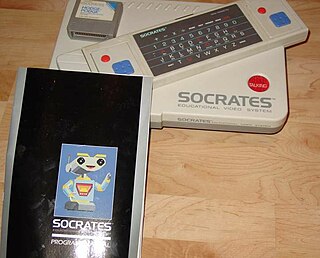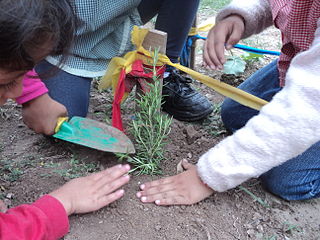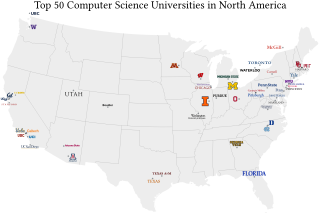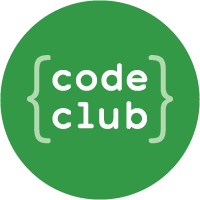Related Research Articles

Phonics is a method for teaching reading and writing to beginners. To use phonics is to teach the relationship between the sounds of the spoken language (phonemes), and the letters (graphemes) or groups of letters or syllables of the written language. Phonics is also known as the alphabetic principle or the alphabetic code. It can be used with any writing system that is alphabetic, such as that of English, Russian, and most other languages. Phonics is also sometimes used as part of the process of teaching Chinese people to read and write Chinese characters, which are not alphabetic, using pinyin, which is alphabetic.
Language education – the process and practice of teaching a second or foreign language – is primarily a branch of applied linguistics, but can be an interdisciplinary field. There are four main learning categories for language education: communicative competencies, proficiencies, cross-cultural experiences, and multiple literacies.
BrainPop is a group of children's educational websites based in New York City. It hosts over 1,000 short animated movies for students in grades K–8, together with quizzes and related materials, covering the subjects of science, social studies, English, math, engineering and technology, health, arts and music. In 2022, Kirkbi A/S, the private investment and holding company that owns a controlling stake in Lego, acquired BrainPop.
The ProgramByDesign project is an outreach effort of the PLT research group. The goal is to train college faculty, high school teachers, and possibly even middle school teachers, in programming and computing.

Sally Ride Science at UC San Diego is a nonprofit run by the University of California, San Diego. It was founded as a company in 2001 by Sally Ride, America's first woman in space, along with Tam O'Shaughnessy, Karen Flammer, Terry McEntee, and Alann Lopes to inspire young people in science, technology, engineering, and math (STEM) and to promote STEM literacy. Sally Ride Science was relaunched as a non-profit at UC San Diego on October 1, 2015. It is based at UC San Diego Extension, and its programs are coordinated jointly by UC San Diego Extension, Scripps Institution of Oceanography, and San Diego Supercomputer Center. O'Shaughnessy is executive director and Flammer is director of education for Sally Ride Science at UC San Diego.
Eklavya is an Indian NGO based in Bhopal, Madhya Pradesh working in the field of education. It was registered as an all India in 1982. The organization is named after Eklavya, the protagonist of a story in the Mahabharat, for his determination to learn even in the absence of a teacher.

An educational video game is a video game that provides learning or training value to the player. Edutainment describes an intentional merger of video games and educational software into a single product. In the narrower sense used here, the term describes educational software which is primarily about entertainment, but tends to educate as well and sells itself partly under the educational umbrella. Normally software of this kind is not structured towards school curricula and does not involve educational advisors.

Garden-based learning (GBL) encompasses programs, activities and projects in which the garden is the foundation for integrated learning, in and across disciplines, through active, engaging, real-world experiences that have personal meaning for children, youth, adults and communities in an informal outside learning setting. Garden-based learning is an instructional strategy that utilizes the garden as a teaching tool.
Lego Education is a Lego theme designed specifically for schools that concentrates sets that can be used by education institutions and includes sets that focus on Duplo and Technic themes and contain larger amounts of pieces. The theme was first introduced in 1999.

Computer science education or computing education is the field of teaching and learning the discipline of computer science, and computational thinking. The field of computer science education encompasses a wide range of topics, from basic programming skills to advanced algorithm design and data analysis. It is a rapidly growing field that is essential to preparing students for careers in the technology industry and other fields that require computational skills.

Differentiated instruction and assessment, also known as differentiated learning or, in education, simply, differentiation, is a framework or philosophy for effective teaching that involves providing all students within their diverse classroom community of learners a range of different avenues for understanding new information in terms of: acquiring content; processing, constructing, or making sense of ideas; and developing teaching materials and assessment measures so that all students within a classroom can learn effectively, regardless of differences in their ability. Differentiated instruction means using different tools, content, and due process in order to successfully reach all individuals. Differentiated instruction, according to Carol Ann Tomlinson, is the process of "ensuring that what a student learns, how he or she learns it, and how the student demonstrates what he or she has learned is a match for that student's readiness level, interests, and preferred mode of learning." According to Boelens et al. (2018), differentiation can be on two different levels: the administration level and the classroom level. The administration level takes the socioeconomic status and gender of students into consideration. At the classroom level, differentiation revolves around content, processing, product, and effects. On the content level, teachers adapt what they are teaching to meet the needs of students. This can mean making content more challenging or simplified for students based on their levels. The process of learning can be differentiated as well. Teachers may choose to teach individually at a time, assign problems to small groups, partners or the whole group depending on the needs of the students. By differentiating product, teachers decide how students will present what they have learned. This may take the form of videos, graphic organizers, photo presentations, writing, and oral presentations. All these take place in a safe classroom environment where students feel respected and valued—effects.
Individual education is a school system rooted in the individual psychology of Alfred Adler. Designed by Raymond Corsini, the individual education program includes a number of basic principles. The program consists of three components academic, creative/applied and socialization. Corsini also outlined disciplinary procedures and a number of other principles to ensure the most productive possible school environment.

Code Club is a voluntary initiative, founded in 2012. The initiative aims to provide opportunities for children aged 9 to 13 to develop coding skills through free after-school clubs. As of November 2015, over 3,800 schools and other public venues established a Code Club, regularly attended by an estimated 44,000 young people across the UK. The organization also expanded internationally, and there are now over 13,000 Code Club operating worldwide. Volunteer programmers and software developers give their time to run Code Club sessions, passing on their programming skills and mentoring the young students. Children create their own computer games, animations and websites, learning how to use technology creatively.

In the United States, elementary schools are the main point of delivery of primary education, for children between the ages of 4–11 and coming between pre-kindergarten and secondary education.

Code.org is a non-profit organization and educational website founded by Hadi and Ali Partovi aimed at K-12 students that specializes in computer science. The website includes free coding lessons and other resources. The initiative also targets schools in an attempt to encourage them to include more computer science classes in the curriculum. On December 9, 2013, they launched the Hour of Code nationwide to promote computer science during Computer Science Education Week through December 15, 2013.
Bootstrap is based at Brown University (USA), and builds on the research and development done there. Bootstrap curriculum consists of 4 research-based curricular computer science modules for grades 6-12. The 4 modules are Bootstrap:Algebra, Bootstrap:Reactive, Bootstrap:Data Science, and Bootstrap:Physics. Bootstrap materials reinforce core concepts from mainstream subjects like Math, Physics and more, enabling non-CS teachers to adopt the introductory materials while delivering rigorous and engaging computing content drawn from Computer Science classes at universities like Brown, WPI, and Northeastern.
EarSketch is a free educational programming environment. Its core purpose is to teach coding in two widely used languages, Python and JavaScript, through music composing and remixing. This learning environment was developed first at Georgia Institute of Technology, under Prof. Jason Freeman and Prof. Brian Magerko.
Marina Umaschi Bers is the Augustus Long Professor of Education at Boston College. Bers holds a secondary appointment in Boston College's Department of Computer Science. Bers directs the interdisciplinary DevTech Research Group, which she started in 2001 at Tufts University. Her research involves the design and study of innovative learning technologies to promote children's positive development. She is known for her work in the field of early childhood computer science with projects of national and international visibility. Bers is the co-creator of the free ScratchJr programming language, used by 35 million children, and the creator of the KIBO robotic kit, which has no screens or keyboards.
CodeMonkey is an educational computer coding environment that allows beginners to learn computer programming concepts and languages. CodeMonkey is intended for students ages 6–14. Students learn text-based coding on languages like Python, Blockly and CoffeeScript, as well as learning the fundamentals of computer science and math. The software was first released in 2014, and was originally developed by Jonathan Schor, Ido Schor and Yishai Pinchover, supported by the Center for Educational Technology in Israel.
References
- 1 2 3 "Code For Life Official Website".
- ↑ "Code for Life: Educate". Code for Life. 5 October 2020.
- ↑ Bateman, Kayleigh (21 July 2014). "Ocado Technology readies primary school teachers with code initiative". Computer Weekly. Archived from the original on 3 August 2014 – via Internet Archive.
- ↑ "Why we've open-sourced Code for Life". www.ocadotechnology.com. Archived from the original on 7 August 2016. Retrieved 3 August 2016.
- 1 2 Neatham, Anne Marie (5 May 2020). ""Keep Kids Coding"". Ocado Group.
- ↑ "Code for Life, Rapid Router with Blockly". STEM Learning. Retrieved 6 September 2016.
- ↑ "Code for Life, Rapid Router with Python". STEM Learning. Retrieved 6 September 2016.